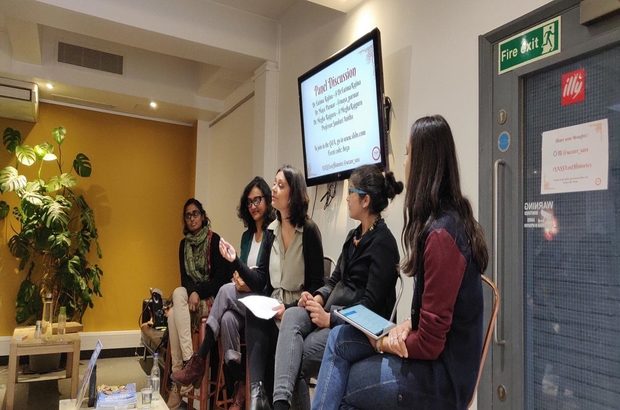ASYIA IFTIKHAR reports on an SASS conference exploring the lost histories of South Asian women in Britain.
On Saturday 16th November, South Asian Sisters Speak (SASS), hosted an event exploring South Asian women and their contribution to British history. The room was buzzing with anticipation, packed, and ready to delve into the lives and works of four incredible professors.
‘You can tell by how packed the event is, how needed it was’ – audience member
Professor Sundari Anitha, Dr Fatima Rajina, Dr Maya Parmar and Dr Megha Rajguru sat at the front, expressing pleasure at such a big and engaged crowd, quite different to the lectures they teach. In my time as a humanities student, I have noticed how rare it is to have a single South Asian woman teaching, let alone to find four highly esteemed academics on a panel discussion. It is easy to underestimate the power of seeing your heritage presented in what you are taught and who you are taught by. As BAME people, we go most of our lives being taught white history by white people. Against this background, it is a euphoric moment when we get the chance to learn about our own past.

Professor Sundari Anitha spoke first, with a snapshot of her research on South Asian women and workers’ rights. She related the story of the Grunswick Strike (1976-78) and the 20,000 South Asian women at the forefront of the fight for basic equal rights.
This protest, untaught by the British curriculum, and never mentioned in historical discourse (unless you are doing a specialised pHD), was revolutionary for the South Asian community and their voice in modern day Britain.
‘Use of the term ‘South Asian’ is a political act of resistance to show that we cannot be divided, we have a shared history’ – Professor Sundari
Dr Fatima Rajina then took the stage, speaking about Bengali’s place in East London in the 1970s, and their effect on the development of culture there. Her research aimed to break down stereotypes and misinformation. For example, we learnt that the geographical placement of the East India Company meant that for decades, there was constant movement of the Bengali community to East London. This fact belies the popular perception that the community appeared suddenly and ‘took over’. She also explored modern South Asian identity and examined the complexity of maintaining solidarity between a broad and varied range of communities.
Dr Maya Parmar then spoke about the term ‘double diaspora’, specifically about the community who migrated from India to East Africa (e.g. Kenya) and subsequently moved to Britain. She talked about the struggle of identity, and the need to diversify the way we understand British history and decide who is part of the narrative. Her speciality in literature also opened the discussion of the lack of representation of South Asian women in books and publishing.
Finally, Dr Megha Rajguru finished up the talks, as a professor of History of Art at the University of Brighton, by speaking about South Asian engagement in museums and galleries. She spoke about a group of Hindu Women, invited by a local museum to set up a display of a Hindu shrine, and the fascinating power dynamics. The museum’s proprietors felt they were doing them a favour by giving them an opportunity to represent their culture. On the other hand the women, who were mostly successful business people, they were doing a favour by creating the exhibition for the general public.

In the open panel discussion afterward, the panelists spoke about decolonising the curriculum and the experience of South Asian women in academia. Right now, there is a nationwide movement to decolonise the curriculum and diversify what we are taught about.
‘Teaching is the most political act’ – Dr Fatima Rajina
However, there were concerns raised about the approach and logistics of the entire movement. Firstly, it would require rewriting British History. One of the speakers remembered the way that ‘every conversation about the empire was tinged with pride’ during their school days. So many set texts are written from one totalising perspective. We have entered a vicious cycle of not being taught about the diverse breadth of history and thus having no one to teach it. Currently, most education concerning the South Asian community is tokenistic. Institutions prove their commitment to ‘diversity’ with a day of eating samosas or dressing in a Sari. There is also a great burden placed on the South Asian community to do all the academic and emotional labour, often unpaid, in order to diversify the curriculum.
‘It’s imperative that we start to diversify what we think of as British history, to include our own stories’ – Dr Maya Parmar
The whole panel, sadly only two hours long, could have gone on all day. Discussions like this are so rarely had, especially regarding the research of these incredible academics. Hopefully, there will be more events like it in the future: it is these people and these conversations that push forward the pursuit of history and truth.
feature image courtesy of Asyia Iftikhar





